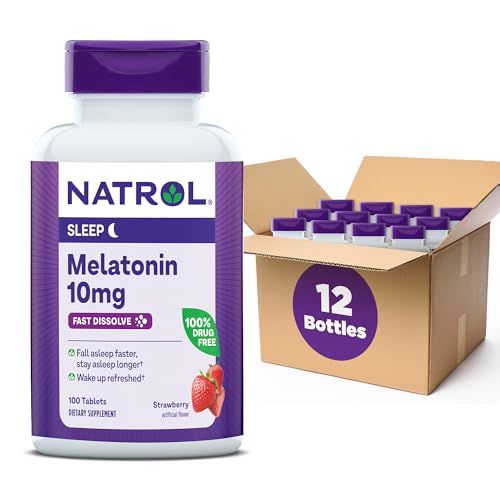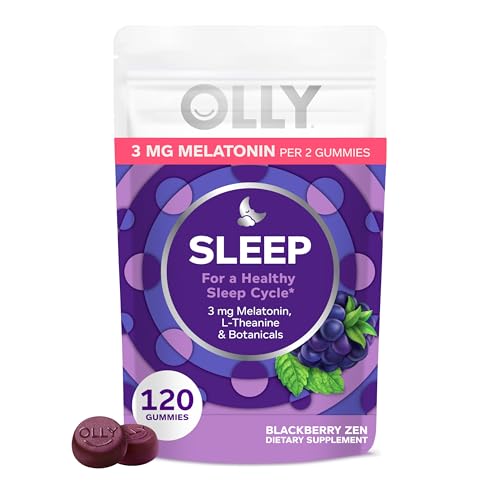Disclosure
This website is a participant in the Amazon Services LLC Associates Program, an affiliate advertising program designed to provide a means for us to earn fees by linking to Amazon.com and affiliated sites.
Yes, it is possible to overdose on melatonin, but it’s not usually life-threatening. Still, taking too much can disrupt your sleep cycle, cause unwanted side effects, and potentially lead to more serious issues if misused over time.
Melatonin is a hormone your body naturally produces to help regulate sleep. As a supplement, it’s widely used to treat insomnia, jet lag, and shift work sleep disorders. It’s considered safe when used appropriately, but “more” doesn’t always mean “better” when it comes to sleep aids.
What many don’t realize is that melatonin supplements vary greatly in strength, and the ideal dosage can differ from person to person. In fact, what’s considered “too much” isn’t the same for everyone. Some people experience side effects even with low doses, while others tolerate higher amounts.
Best Melatonin Supplements for Sleep Support
Choosing the right melatonin supplement can make a huge difference in both safety and effectiveness. Not all melatonin products are created equal — some contain more than labeled, while others include additives or release mechanisms that don’t suit every user.
Below are three top melatonin supplements that are trusted by sleep experts and consumers alike. Each offers a unique benefit tailored to different sleep needs:
Natrol Melatonin Fast Dissolve Tablets (10mg)
Why we picked it:
- Quick-dissolve formula for faster absorption
- Ideal for those who need help falling asleep quickly
- 100% drug-free and non-habit forming
- FALL ASLEEP FASTER, STAY ASLEEP LONGER: Natrol melatonin promotes sleep in as…
- SLEEP SUPPORT: Natrol Melatonin Fast Dissolve Tablets for adults help you fall…
- 100% DRUG-FREE SLEEP AID SUPPLEMENTS: These melatonin 10 mg fast dissolve…
Nature Made Melatonin 3mg Tablets
Why we picked it:
- Lower dose great for beginners or sensitive individuals
- USP Verified for purity and potency
- Gentle support for occasional sleeplessness
- Adults take one of these Melatonin 3mg sleep supplements one hour before bedtime…
- Occasional use sleep support supplement: Contains one 240 count bottle of Nature…
- These Nature Made Melatonin Tablets are 100% drug free, gluten free, non habit…
Olly Sleep Gummies with Melatonin, L-Theanine & Botanicals
Why we picked it:
- Combines melatonin with calming ingredients like chamomile and lemon balm
- Tasty, chewable option for those who dislike pills
- Great for promoting overall relaxation, not just sleep onset
- OLLY SLEEP GUMMIES: Our Melatonin gummies, with L-Theanine and Botanical…
- THE GOODS INSIDE: Featuring 3mg of Melatonin, a sleepy time superstar ingredient…
- HOW TO TAKE: Take 2 gummies 30 minutes before bed. Chew thoroughly before…
What Happens If You Take Too Much Melatonin?
While melatonin is considered safe for short-term use, taking too much can lead to a range of uncomfortable — and sometimes concerning — side effects. Overdosing on melatonin doesn’t typically result in fatal outcomes, but it can seriously disrupt your natural sleep-wake cycle and affect other systems in the body.
Common Symptoms of Melatonin Overdose
Here’s what you might experience if you take more melatonin than your body can handle:
- Daytime Drowsiness – Excess melatonin can make you feel groggy or disoriented the next day.
- Headaches – A common and annoying side effect of high doses.
- Nausea or Stomach Cramps – Digestive upset may follow.
- Irritability or Mood Swings – Melatonin impacts neurotransmitters linked to mood regulation.
- Dizziness – Especially after standing up quickly, due to melatonin’s impact on blood pressure.
- Vivid Dreams or Nightmares – Too much melatonin may overstimulate brain activity during REM sleep.
- Hormonal Disruption – Melatonin affects reproductive hormones and long-term misuse may interfere with fertility or menstruation cycles.
Rare but Serious Effects
In more extreme cases, especially when combined with medications or underlying conditions, too much melatonin could lead to:
- Low Blood Pressure
- Confusion or Disorientation
- Increased Risk of Seizures (in those with seizure disorders)
Why It Happens
Melatonin is a hormone, and your body is sensitive to hormonal balance. When you take more than needed, it can send confusing signals to your brain — essentially telling it to stay asleep when it should be awake.
What Is the Recommended Safe Dosage of Melatonin?
Melatonin dosage isn’t one-size-fits-all. The right amount depends on your age, sleep issue, sensitivity to melatonin, and even your body weight. Taking more doesn’t necessarily mean better results — in fact, lower doses are often more effective.
General Guidelines for Safe Melatonin Use
- Adults:
- Starting Dose: 0.5 mg to 1 mg
- Common Range: 1 mg to 5 mg, 30 to 60 minutes before bedtime
- Maximum Safe Limit (short-term use): Up to 10 mg under medical supervision
- Children:
- Recommended: Only under pediatric guidance
- Typical Range: 0.5 mg to 3 mg
- High doses may interfere with natural development, especially puberty
- Older Adults:
- Lower doses preferred: 0.3 mg to 2 mg
- Helps avoid next-day grogginess and minimize fall risks
Tips for Finding Your Ideal Dose
- Start Low: Begin with the smallest dose (e.g., 0.5 mg or 1 mg) and increase only if necessary.
- Track Effects: Keep a sleep journal to track how your body responds.
- Be Consistent: Take it at the same time each evening to support your circadian rhythm.
- Avoid Long-Term Use Without Guidance: Melatonin is best for short-term support unless directed by a healthcare professional.
Important Note:
Extended-release melatonin releases the hormone slowly and may be better for staying asleep, while immediate-release helps with falling asleep faster. Always read the label.
How to Use Melatonin Safely and Effectively
To get the best results from melatonin and avoid side effects, how you use it is just as important as how much you take. Many people misuse melatonin by taking too much or taking it at the wrong time — which can actually make sleep problems worse.
Best Practices for Safe Use
- Take it 30–60 minutes before bedtime
Melatonin signals your brain that it’s time to wind down. Taking it too early or too late may throw off your rhythm. - Use the lowest effective dose
More isn’t better. Start with 0.5 mg or 1 mg and adjust gradually if needed. - Avoid combining with alcohol or sedatives
This can amplify drowsiness and increase the risk of side effects like dizziness or confusion. - Time it with your schedule
- For insomnia: Take it shortly before bedtime.
- For jet lag: Take it 1–2 hours before your target bedtime in the new time zone.
- For shift work: Take it at the time you intend to sleep during the day.
- Create a calming bedtime routine
Pair melatonin with relaxing activities: reading, meditation, or gentle stretching. - Limit exposure to blue light
Avoid screens 1–2 hours before bed; blue light can suppress your body’s natural melatonin. - Don’t rely on it as a long-term crutch
Melatonin should support sleep habits — not replace them.
When to Seek Medical Advice
- If you’re using melatonin daily for more than two weeks
- If you’re pregnant, breastfeeding, or have a chronic health condition
- If you take medications for mood, blood pressure, or seizures
Who Should Avoid Taking Melatonin?
While melatonin is generally safe for short-term use in healthy adults, it isn’t suitable for everyone. Certain groups may be at higher risk for adverse effects or drug interactions, making melatonin use potentially harmful.
People Who Should Avoid Melatonin or Use with Caution
- Pregnant or Breastfeeding Women
- There’s limited research on melatonin’s safety during pregnancy and breastfeeding.
- Always consult a doctor before using it.
- Children and Teenagers (without supervision)
- Melatonin affects hormonal development and should only be used under pediatric care.
- High doses may interfere with puberty or reproductive hormones.
- People with Autoimmune Conditions
- Melatonin can stimulate the immune system, which may worsen conditions like lupus, rheumatoid arthritis, or multiple sclerosis.
- Those Taking Certain Medications
Melatonin may interact with:- Blood pressure medications (e.g., beta-blockers)
- Anticoagulants (e.g., warfarin)
- Antidepressants or antipsychotics
- Immunosuppressants
Always talk to your doctor before combining melatonin with prescription drugs.
- Individuals with Epilepsy or Seizure Disorders
- High doses may increase the risk of seizures, particularly in children.
- People with Depression or Anxiety Disorders
- Melatonin affects serotonin and mood-regulating neurotransmitters; in some people, it may worsen symptoms.
When in Doubt, Talk to a Healthcare Provider
If you’re unsure whether melatonin is right for you, don’t guess — consult a medical professional. Personalized guidance is the safest route when dealing with sleep supplements.
Conclusion
Melatonin is a powerful ally when used correctly — but like any supplement, it must be treated with care. Yes, it’s possible to overdose on melatonin, though it’s rarely dangerous. Still, taking too much can throw off your sleep cycle, cause unpleasant side effects, and impact your overall well-being.
The key is smart, informed use:
- Start with the lowest effective dose
- Take it at the right time for your specific sleep need
- Avoid long-term use without medical supervision
- Always consider potential interactions with medications or conditions
Frequently Asked Questions About Overdosing on Melatonin
Understanding melatonin and how it works can help you avoid misuse and optimize your sleep. Below are answers to some of the most common questions about melatonin overdose.
Can you die from a melatonin overdose?
- Highly unlikely. Melatonin is considered non-toxic and hasn’t been associated with fatal overdoses.
- However, excessive doses can lead to severe side effects and may worsen existing health issues.
What is considered “too much” melatonin?
- Anything beyond 10 mg per day is typically excessive for most adults.
- Even 3–5 mg may be too much for sensitive individuals or first-time users.
- Children should generally not exceed 3 mg, and only under medical supervision.
How long do melatonin overdose symptoms last?
- Side effects like drowsiness, dizziness, or nausea usually subside within 24 hours.
- Drinking water, resting, and avoiding further doses can help the body recover faster.
What should I do if I accidentally took too much melatonin?
- Don’t panic.
- Skip your next dose and monitor for side effects.
- If symptoms are severe (confusion, low blood pressure, trouble breathing), seek medical attention immediately.
Is it safe to take melatonin every night?
- Short-term nightly use is generally safe for most adults.
- Long-term use should be monitored by a healthcare provider to avoid dependence or hormonal imbalance.
How can I make melatonin more effective without increasing the dose?
- Maintain a consistent bedtime routine
- Avoid screens before bed
- Dim lights in the evening
- Combine with other calming supplements like magnesium (with professional advice)



